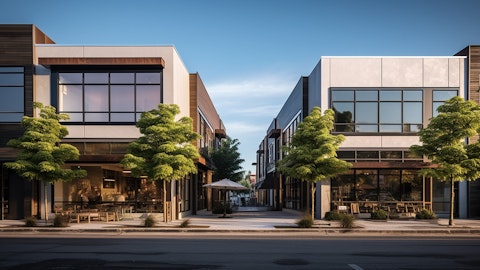Kevin Habicht: Yes. Yes. It’s unusual. It was unusual due to the pandemic for us to actually go from accrual to cash basis and then it’s unusual to reverse it and its gap accounting unusual that you would recognize revenue or income when you do always do this. And so we currently have about 5% of our base rent is still on a cash basis. So there’s the potential for more of that in the future. Now that 5% consists – 90% of that 5% is two tenants, AMC and Frisch’s [ph]. And so I don’t sense – in the near term, there’s going to be that reclassification that we just did. So I’d say in the near term, I don’t – I wouldn’t expect anything on that front.
Smedes Rose: Great. Thank you.
Operator: Your next question is coming from Alec Feygin with Baird.
Alec Feygin: Hi, thank you for taking my question today. So, I want to ask about the size of the development pipeline right now and how you see it trending?
Steve Horn: I would say 2023 was a bit, what we call split-funded program. Just to be clear, we don’t develop assets. We’re more of a funding source to our current tenants on that. So, we’re not having any speculation, permits and leases all in place by the time we deploy capital. Now that being said, the 2024 pipeline currently is not as large as 2023, but 2023 was a historic high for us, and that was a result of the banking market where our tenants on the regional banks weren’t deploying capital, so they came to us for money. So, we had a really strong year in 2023.
Alec Feygin: Okay. Got it. And the second question is, what are you thinking for capitalized interest in 2024?
Kevin Habicht: Yes. And so based on that activity in our split-funded program, we’ll continue to have capitalized interest and so for last year, it totaled $4.3 million for 2023. I think it will be somewhat less than that. So, let’s call it around $3 million maybe. But we’ll see how it plays out. I will now just for everybody. And as a reminder, we do deduct capitalized interest in our calculation of AFFO. I don’t think that’s probably – I don’t think everybody does that. And so I just wanted to kind of highlight that.
Alec Feygin: Thank you. Have a great day.
Kevin Habicht: Thanks, Alec.
Operator: Your next question is coming from Linda Tsai with Jefferies.
Linda Tsai: Yes, hi. Could you discuss some of the trends you’re seeing in the sale-leaseback market?
Steve Horn: Hey, how are you doing, Linda. Yes, the trend is pretty much similar to the way it’s been the last few years. I think with the banks pulled back, there is more of an opportunity for sale leaseback funding. I’m not going to say 2024 is going to be a larger opportunity in 2023 because the regional banks are starting to lend a little bit more. But the cap rate, it’s always a pricing question, as you know, and the bid ask spread was fairly large throughout 2023. It has narrowed substantially. Just case in point of us doing nearly 270 million in the fourth quarter. But we’re being very selective going into 2024 until the capital markets on the equity side, as we feel, are a little bit more open. But the sale leaseback market, again, there’s plenty, it’s undefined by size and there’s plenty of opportunity out there to do deals.
Linda Tsai: And then the delta between acquisition and disposition cap rates, where do you think that trends each quarter?
Steve Horn: Yes. Historically, it’s always been kind of 100 basis points for us. We try to get a little bit more than that. 140 basis points was a significant year for us and that’s kind of why we kind of highlighted on the call. But in our model, we look at 100 basis points.
Linda Tsai: Just one last one. I know bad debt expectations are low, but could you just compare the tenant watch list for you today versus a year ago?
Steve Horn: I have to think about a year ago, but I’d say it’s pretty – the list is consistent. There’s no real new names popping up. A couple have dropped off for better or worse in terms of we had three Bed, Bath & Beyond. We’ve got a handful of Rite Aids and so they’ll die a natural death, I believe. But others that we’ve talked about in recent quarters are still on the list. The at homes we got two big lots or three big lots and two JoAnns. We also own some Frisch’s restaurants, which is a restaurant concept, Big Boys, Midwest Big Boy hamburger concept that we have concerns about and we’ve talked about and then of course the theater exposure. But that’s kind of, I put in a separate bucket a little bit and to be honest, I don’t feel – we feel pretty good about where they are at the moment in terms of their liquidity and ability to pay us rent in the near term.
So – but yes, so all that to say is yes, not, no real change in the list or the composition or size of the list.
Linda Tsai: Great. Thank you.
Operator: Your next question is coming from Ronald Kamdem with Morgan Stanley.
Ronald Kamdem: Hey, just staying on the tenants a little bit. I know you get sales with a lag, obviously from the tenants. But are you sort of seeing anything suggesting that that low end consumer is slowing? I think we hear a lot about it, but curious if any of your concepts or tenants are showing sort of softness there?
Steve Horn: No, I mean, from the data exactly, it is stale. It takes time to get it in and then process it. And not every tenant devolves it quarterly, sometimes it’s annually. But more through discussions I think is more live real time data that we obtain is we’re not seeing the sales of our tenants dropping, so not thinking it’s getting soft by any means. Currently, they’re all performing, I’m not going to say killing it out of the park, but they’re performing well. We do see some margin expansions within the QSR, meaning that they still can get the price through and their labor costs are not eating them up. But overall, we’re not seeing a significant softness within our tenant base.




